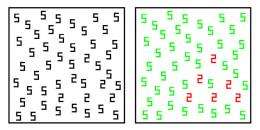December 15, 2009 weblog
People who 'see' numbers have better memories for dates

(PhysOrg.com) -- A new research project has shown that people who perceive numbers visually, and who see sequences of numbers as visual patterns, have better memories for dates and events in the past than people who do not.
The condition is known as time-space synesthesia (also called spatial-sequence synesthesia), a neurological condition in which the senses combine in unusual ways. A person with the condition sees numbers as existing in three-dimensional space, so for example, the year 1980 may seem further away visually than the year 1995. Others may see years as a 3D shape such as a spiral staircase, or months arranged in an circle. The visual responses to the numbers are involuntary, and the synesthete may be unaware for years that their experiences are not shared by others.
There are many types of synesthesia, such as the most common type, grapheme-color synesthesia, in which numbers or letters are always associated with colors, so the number eight might always appear orange, for example, or the word train may always look blue. Other synesthetes may associate words with taste, or sounds to color or images.
Recently, scientists at the University of Edinburgh in Scotland decided to try to find out if people with time-space synesthesia had better memories than people who do not. The researchers, led by psychologist Dr Julia Simner subjected 10 volunteers with spatial-sequence synesthetes to a series of visual/special and temporal tests requiring rapid recall of the dates of over a hundred events that occurred in the period 1950-2008.
The time-space synesthetes were out, on average, by four years, whereas a control group of non-synesthetes were wrong by eight years on average. The synesthetes could also name almost double the number of events from specific years in their own lifetimes than could the control group. The synesthetes were no better than the controls at tasks that were not related to their mental calendars.
The research also suggested there is a connection between time-space synesthesia and the savant-like hyperthymestic syndrome, which is a condition in which people have perfect recall events occurring at any time in their lives.
Dr Simner said the findings, published in the journal Cortex, suggest anyone who can visualize timelines may recall historical events better than others. Most synesthetes consider the phenomenon as a gift they would not want to lose. Simner agreed, saying that synesthetes have a "subtle, extra gift."
More information: A foundation for savantism? Visuo-spatial synaesthetes present with cognitive benefits, Cortex, Volume 45, Issue 10, November-December 2009, Pages 1246-1260; doi:10.1016/j.cortex.2009.07.007
© 2009 PhysOrg.com












